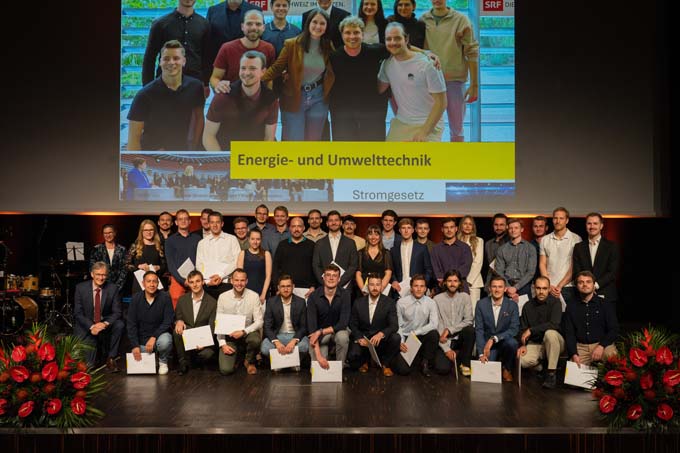Setting high goals as motivation
Swiss universities of applied sciences train a large proportion of the skilled workers on whom the economy is so dependent. Training, continuing education, application-oriented research & development and services are part of the portfolio of every university of applied sciences, including the Lucerne University of Applied Sciences and Arts. In competition with other educational institutions, it is treading the "path of excellence" and has reached another level in the process

Dhe Lucerne University of Applied Sciences and Arts - founded in 1997 - is one of seven public universities of applied sciences in Switzerland. It is supported by the cantons of Lucerne, Uri, Schwyz, Obwalden, Nidwalden and Zug. The six departments of Engineering & Architecture, Business, Information Technology, Social Work, Design & Art and Music are united under the common roof. The Lucerne University of Applied Sciences and Arts also competes with other universities of applied sciences in the highly regulated education market. Accordingly, with its broad range of subjects, it has long since been courting students not only "on its doorstep", but - like all the others - nationally and increasingly also internationally. If you want to keep up with the competition, you have to offer one thing above all else: Quality. In this respect, the Lucerne University of Applied Sciences and Arts sets milestones
Leading the way in business excellence
Since 2003, the Lucerne University of Applied Sciences and Arts has complied with the federal requirement that every university of applied sciences must have a quality management system by committing itself to business excellence according to the EFQM model. In 2006, the first level "Committed to Excellence" was tackled and in 2010, as a further milestone, the "Recognized for Excellence" level was reached with the "3star" award. In 2013, another star followed and the application for the ESPRIX Swiss Award for Excellence is the preliminary highlight of the "Path of Excellence". By its own admission, the Lucerne University of Applied Sciences and Arts thus plays a leading role in the higher education sector. It has represented this approach in various national committees and thus made its contribution to ensuring that the basic principles of the EFQM approach are recognisable in the standards of the new Higher Education Promotion and Coordination Act (HFKG).
Important player in central Switzerland
The track record of the Lucerne University of Applied Sciences and Arts is impressive: 1,365 students graduated with a Bachelor's or Master's degree in 2014. Most graduates - as studies have shown - have no problem finding a job in practice. It can be seen that graduates quickly become sought-after top performers thanks to the knowledge they have acquired during their studies. And the "supply" of specialists continues to be ensured: 5913 students were enrolled in the departments (as of October 2014). The wide range of continuing education courses offered by the Lucerne University of Applied Sciences and Arts is also very popular: 4364 professionals take advantage of the almost 200 continuing education courses for their personal advancement. The importance of the Lucerne University of Applied Sciences and Arts for the entire region of Central Switzerland should not be underestimated: on the one hand, with over 1500 employees, it is one of the most important employers. On the other hand, with over 400 research projects, some of which are carried out in close cooperation with private companies and other national and international partners, it makes a significant contribution to innovation with regional and national benefits.
New Department of Information Technology
Where there is light, there is also shadow, as is well known. The Lucerne University of Applied Sciences and Arts faces a number of strategic challenges. One of these is the shortage of skilled workers. Because a university of applied sciences not only "produces" specialists, it needs some itself, namely for securing the next generation of academics. With the introduction of a career model, a more precise doctoral model and accentuated requirement and activity profiles, the Lucerne University of Applied Sciences and Arts has in the meantime created the preconditions for being able to specifically promote junior staff. Another "construction site" - against the backdrop of the digital transformation and the shortage of specialists in IT - is the establishment of a new Department of Computer Science. This is due to start in autumn 2016 and should be able to educate around 1000 students when completed. The university management is also working intensively on the topic of digitalisation. For example, the framework conditions are currently being developed in order to create more digital competence in teaching.
Steady improvement
In principle, according to the self-assessment of the Lucerne University of Applied Sciences and Arts, there is potential for development in many places. This starts with the processes. Since 2002, the UAS has compiled a collection of its processes, which are accessible to all departments via the intranet. This forms the basis for the continuous development of quality management. Not all departments and areas are at the same stage yet: while the Department of Engineering & Architecture, for example, has been ISO 9001 certified for years, the university management as a whole is working on possibilities for a profitable standardisation of processes. The process map developed against this background is considered part of a process vision and can be broken down to all departments.
Work is also underway to increase customer satisfaction. Repeated surveys of students and graduates show an upward trend in overall satisfaction. The Lucerne University of Applied Sciences and Arts scores well with students on key criteria such as practical relevance or support, but not all targets have been met. From the point of view of the employers who employ the graduates, things look better: The majority of them rate the qualifications of the graduates as "good", and employers are mostly "very satisfied" with the quality of further education at the Lucerne University of Applied Sciences and Arts. Rector Markus Hodel is optimistic about the future: "High goals are also motivation.









